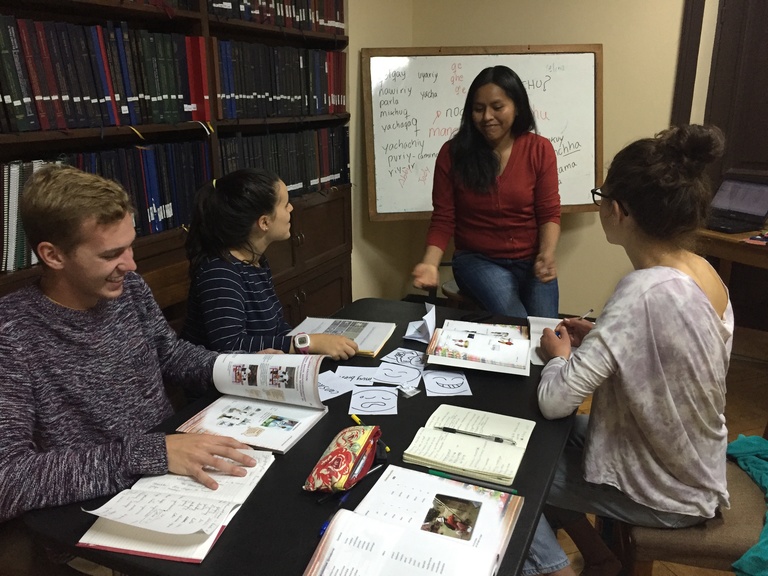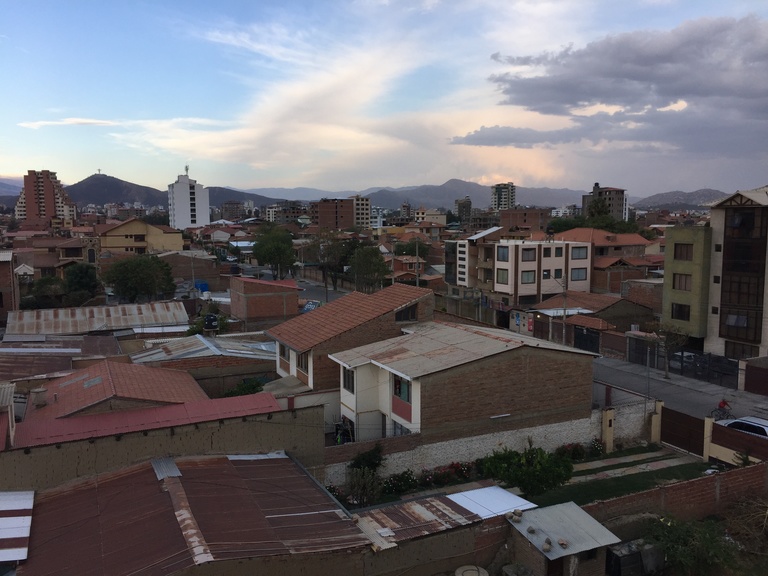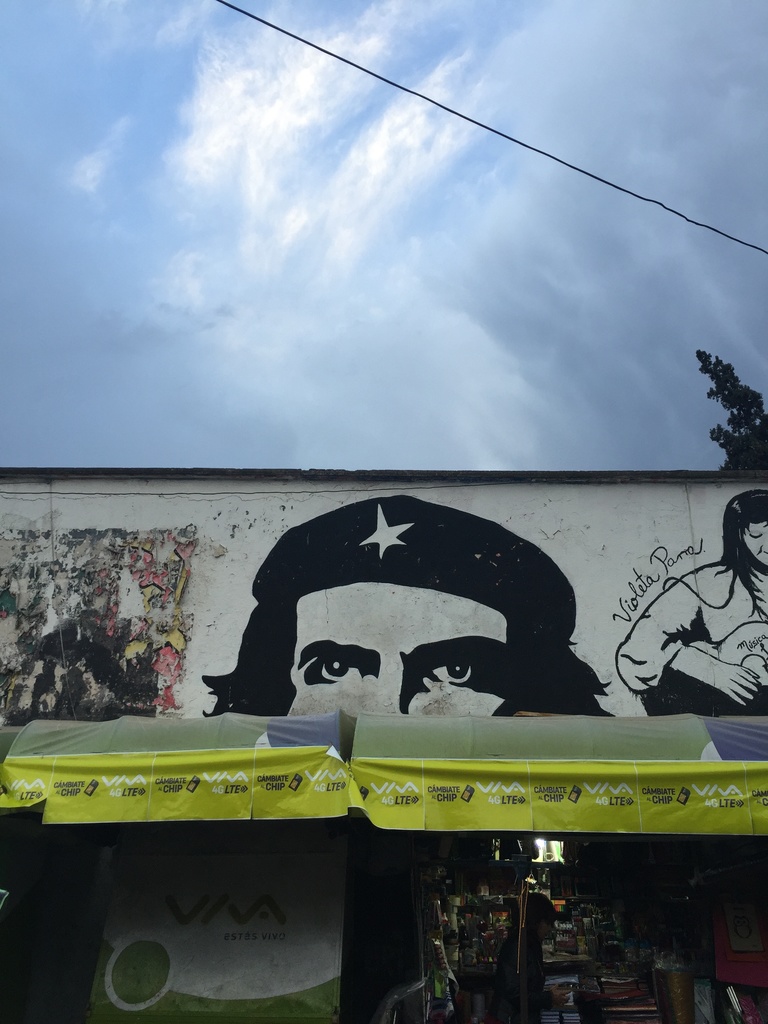By Alex Bare*

Quechua class with Evelyn, a professor of Quechua from the Chapare Province near Cochabamba.
Although my daily life in Bolivia is so much more than a class schedule, I want to describe what college is like in Cochabamba. It’s (almost) perfect and I (almost) never speak English.
From indigenous languages to week-long field trips, my class schedule is anything but dull. Here’s a look at my classes:
- Quechua I
Super chill introductory class to the most widely spoken indigenous language in the country (35% of Bolivians are speakers).
- Historical and Contemporary Social Change
Bolivian history 101 covering everything from 1492 to 2016.
- “Vivir Bien:” Andean and Amazonian Communities
Culturally-focused class that covers all of Bolivia’s 36 or so ethnic groups. It also includes village homestays in an Aymara community in the highlands and with a Chiquitano community in the Amazon.
- Research Methods and Ethics
Could also go by the alternative title of “how to not be problematic and racist in a country where racism is already a problem and ways to avoid perpetuating colonialism via your independent research projects.”
- Independent Research Project (ISP)
A classic part of all School for International Training study abroad programs. During the last month of our time here, all classes end and students embark on independent research on whatever topic interests them. Many students are relocated to other parts of the country to do their research.
- Documentary Film
Not really a class, but kind of. SIT Bolivia lets students do their research in other formats besides a 40-page paper. I’m planning on making a documentary video, so I attend this non-credit bearing class.

Some lovely views from a friend's balcony in my neighborhood.
All of my classes are taught at the Universidad Mayor de San Simón’s graduate school. Our lecturers include the former Vice Minister of Government, the former Minister of Defense (who was tortured by a repressive government in the 80s), and a traditional Aymara priest.
One drawback is that my classmates are the 20 other American students on my program, meaning there is a tendency to speak English. A lot. To combat this, I signed an agreement with myself banning my use of spoken English for 3 months. Note: exceptions include emergencies, singing songs in English, and when my mom calls me.
I lasted a week…until last Thursday.
For those of you who read my last blog post, our entire program was deeply affected by our visit to mines of Potosí. The experience also unearthed some unresolved racial tensions among the students in our program.
What was supposed to be a discussion about immigration from Bolivia quickly escalated when white students began discussing whether or not immigration was “worth it.” A daughter of immigrants quickly responded that people of privilege can never understand what it’s like to be an immigrant of color, nor do they have the right to pretend so.
The ensuing two days of tension in our ethics class eventually culminated in students walking out over frustrations with the lack of understanding by white students and the unnecessary pressure these discussions put on the four Latina, black, and multiracial students in our classes. Don’t get me wrong: our academic director works hard to highlight privilege and underrepresented voices. Living in this country, however, heightens one’s awareness of race in a way I struggle to describe.
Yes, I indeed broke my contract and spoke English to express my frustrations. English gave me the clarity to voice support for my brothers and sisters of color, who happen to be among my closest friends in the program. I think this falls under the “emergency” exception.

Nothing like some revolutionary artwork at the university entrance to get you into the spirit of learning.
While all my classes are in Spanish, you might be wondering why I’m not taking any Spanish language classes. I actually ended up testing out of the available Spanish classes, so I got placed in Quechua. Learning the most widely spoken American indigenous language has proved fascinating. It can’t get much better than when my homework is going to the market to buy fruits from the little old ladies in Quechua.
Not only that, but it allows me to show respect for the indigenous people of this country. When I introduce myself in Quechua at meetings with widowed miners or a domestic workers’ syndicate, it says “your people matter.” This is ever more important as Bolivia continues its transition to the Plurinational State of Bolivia, meaning all ethnic groups and languages are officially recognized. In fact, it is illegal to work as a public servant and not be fluent in an indigenous language. A recent survey indicated only 10% are in compliance with the law.
Word of The Week
Hemeroteca (noun):
- A library specifically for newspaper archives
Why It’s Important
I’ve begun my research for my independent research project!! This means lots of time spent in the hemeroteca culling articles to read. It also means…I’ve selected my topic!!!!
(Drum roll)
During the next few months, I will research Bolivia’s LGBTQ community. The final product will incorporate the stories of several people into a documentary video about what it means to be LGBTQ in this country. Bolivia has some of the most progressive laws in all of Latin America in regards to sexual orientation and gender identity, including discrimination protection, the right to change sex in government documents, and possibly a hate crimes protection law in the next few years. Sex change operations are performed in La Paz. Cochabamba’s newspaper even published a front page photo of a same-sex couple kissing earlier this summer.
Despite this, there are definite discrepancies in the enforcement of these laws. Over the next few months, I will be talking with a lot of people and reading a lot of news to get a clear picture of this vibrant community’s reality.
Look out for my article next week when I’ll be writing live from La Paz, Bolivia! Tinkunakama / hasta luego / until next time ~
*Alex Bare is studying International Relations and minoring in Spanish at the University of Iowa. The Walcott, Iowa, native is spending his semester in Bolivia, with a focus on Multiculturalism, Globalization and Social Change.
Student blog entries posted to this International Accents page may not reflect the opinions and recommendations of UI Study Abroad and International Programs. The blog is intended to give students a forum for free expression of thoughts and experiences abroad in a respectful space.